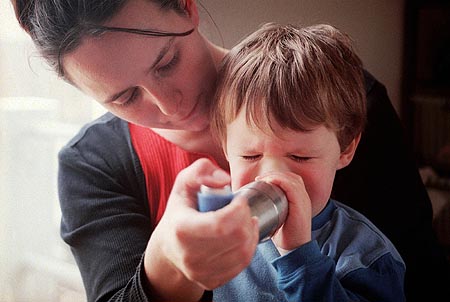Asthma, a chronic lung disease caused by inflammation and narrowing of the respiratory passageways, causes shortness of breath and wheezing. People diagnosed with asthma might take a wide range of medications, from severe cases in which the person must take the prescribed medications regularly to mild sufferers who can rely on alternative remedies. Regardless of your treatment plan, you can take steps to reduce asthma symptoms and even help minimize the need for prescription drugs.
1. Allergens stand among the most common causes that trigger asthma symptoms. To minimize the symptoms, you must identify and reduce these allergens and conduct air testing to identify the cause of the allergy. The most common allergens include dust mites, bedroom carpeting, molds and animal dander. Minimize your exposure by encasing your bed sheets and mattress with dust mite-proof covers, and replace your carpet with wood flooring. If your pet proves an asthma trigger for you, you may need to get rid of it. If you spot any mold buildup, make sure to contact a mold inspections and removal service immediately and prevent it from growing inside your home.
2. Place plants inside your home. Plants provide added oxygen and help maintain the quality of your home’s indoor air. Search for indoor plants you can display around the house. Ensure you select plants carefully, as they may cause pollen allergies triggered by pollens from flowering plants.
3. Eat foods friendly to the lungs. Include fresh fruits and vegetables in your diet to help your lungs stay in good condition. Yogurt has natural anti-fungal and antibacterial properties that can help you get rid of harmful bacteria in the body. Garlic keeps the passageways open and eases inflammation. Foods high in antioxidants help protect the respiratory passageways. Keep in mind the types of foods to avoid as well, since certain foods promote the production of mucous. Common allergens, dairy products can trigger asthma symptoms. Some refer to the result of their allergen testing whether the food is good or bad for them.

4. Take helpful supplements. Omega-3 fatty acids might reduce your body’s inflammatory responses, and research has shown magnesium can improve lung function and reduce asthma attacks. Increase your intake of vitamin C. The dosage to remain asthma-free is 1000 milligrams of vitamin C every day. Consult your pediatrician for proper dosages.
5. Drink some hot tea or coffee. The steam will help open your air passageways for easy breathing, and the liquid can provide significant protection against histamine, one of the major causes of asthma.
6. Drink water. It’s a simple, safe and natural asthma remedy. Dehydration causes all cells to release histamine, which has associations with asthma symptoms. Make sure you drink one-half your body weight in ounces of pure water each day. This also keeps the lungs hydrated to prevent them from feel tight and sensitive.
7. Asthma results from environmental and genetic factors, and your emotions can also trigger the symptoms. If you feel stressed out, you might experience difficulty in breathing. Therefore, you must learn how to relax. Practice various techniques such as yoga and aromatherapy to relax those muscles and help strengthen your respiratory system.
8. Whatever techniques work for you, ensure you work closely with your pediatrician. Have her balance your natural treatment approach with more conventional therapies to help you control your asthma symptoms.
